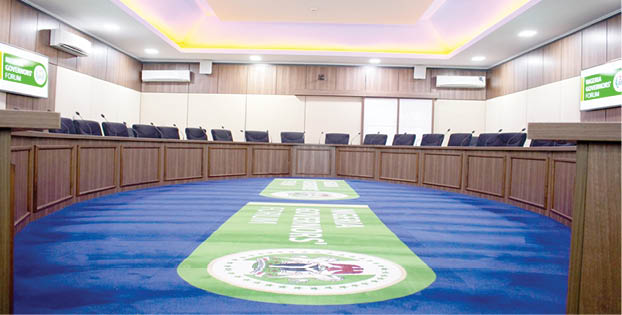Governors are empowered by the constitution to appoint heads of the Civil Service Commission, Independent Electoral Commission and the Judicial Service Commission, among others in their respective states. These appointments are subject to the approval of the state houses of assembly, which independence, however, have been compromised by the governors.
While wielding enormous powers in their respective states, the governors more often than not abuse such privileges with brazen actions and decisions that go against the tenets of democracy.
The most common include the outright dissolution of local government councils in states previously ruled by opposition parties and dissolving party structures to erect new ones comprising of their loyalists.
These are now seen as mild and normal because there are instances where the governors, both past and current, have gone overboard in some of the actions they took.
- Governors’ overbearing influence on Nigeria: They are alphas and omegas in their states – Ngilari
- Fishing for survival: The story of Isoko fisherwomen
The many sins of governors
It would be recalled that the immediate past governor of Edo State, Godwin Obaseki, refused to inaugurate some members of House of Assembly who were not members of his party.
The lawmakers-elect were not sworn in because they were said to be loyalists of a former governor, Adams Oshiomhole, and for that, the state had to suffer from lack of opposition in the legislature. This development festered from 2019 till he left office few days ago.
He also refused to swear in three out of the eight judges who were recommended by the National Judicial Commission (NJC) into the state High Court.
Obaseki’s fight with his deputy, Philip Shaibu to ensure that the latter did not succeed him also comes as brazen. This was more so when the then governor refused to allow Shaibu return to office after a court nullified his purported impeachment.
Also, the governor of Plateau State, Caleb Mutfwang, shocked many when, just a few months after his inauguration, he started having issues with the state House of Assembly.
It started when the election petition tribunal sitting in Jos sacked Assembly members of his party, making the opposition All Progressives Congress (APC) the majority in the House.
For months, the Assembly was not enabled to sit, as the issue of which party should take leadership position in the house lingered.
Even when the Assembly finally convened, it was on the terms dictated by the executive, which foreclosed the chances of the opposition members who are clearly in the majority from taking over the leadership of the House.
The executive came under heavy criticism as a result of this as the period the Assembly was rendered inactive meant that the state was governed without the full complements of a legislature.
Another recent case is that of Kogi State, where the governor, Ahmed Usman Ododo, in what seemed as appreciation for the role his predecessor, Yahaya Bello, played in his emergence as governor, shielded the latter from arrest by operatives of the Economic and Financial Crimes Commission (EFCC).
At a time, the anti-graft agency went to the Abuja residence of the former governor to effect his arrest, but rather than submit to the operatives of the agency, the former governor reportedly sought the intervention of the governor, who was said to have driven to his house to offer some ‘protection.’
Even when Bello chose to submit himself for interrogation, still hiding under the governor’ s immunity, he elected to go with him, and because of that, the anti-graft agency declined attending to him.
Between 1999 and 2007, Bola Ahmed Tinubu, while serving as Lagos State governor, also demonstrated the unending powers of Nigerian governors.
It would be recalled that he removed his then deputy, Kofo Akerele Bucknor and replaced her with Femi Pedro, who he also replaced with Abiodun Ogunlewe, in a spate of eight years.
Both Bucknor and Pedro lost their seats clearly due to political disagreements with the then governor. The case of Pedro was more dramatic as he was impeached on May 10, 2007, weeks to the end of their tenure.
Weekend Trust recalls the situation in Plateau State when former Governor Jonah Jang shocked many with the appointment of his son, Yakubu Jang, as special adviser on special duties.
The younger Jang later became the state’s commissioner for lands and urban planning, serving in his father’s cabinet in what was seen as an open case of nepotism. However, some defended the action on the basis that Yakubu worked tirelessly for the reelection of his father.
Malam Isa Yuguda, the then governor of Bauchi State, also showed how far governors could go to protect their interests.
He was said to have been behind the impeachment of his deputy, Alhaji Mohammed Garba Gadi, for refusing to defect with him when he moved to the Peoples Democratic Party (PDP).
Yuguda and Gadi were elected on the platform of the defunct All Nigerian Peoples Party (ANPP) but the deputy elected to remain in the ANPP rather than move to another party with the governor, and for that, he was shown the exit door.
A former governor of Imo State, Rochas Okorocha, was also accused of nepotism when he defied protests and criticisms and jumped over his deputy and others who were interested in the governorship ticket of his party to favour his son-in-law.
The move did not work as the process was annulled by the APC national leadership.
His son-in-law then moved to the Action Alliance (AA), seen as an idea by his father-in-law to create a special purpose vehicle for him to stand as a candidate in the general elections. But that became his albatross as he was accused of contesting on two different platforms.
It goes on
A former Ekiti State governor, Ayo Fayose, also contributed his quota when he presented the state’s appropriation bill for the 2015 fiscal year to only seven lawmakers in the House of Assembly.
It happened at a time when there was a tussle over the speakership of the House, so he chose to do business with only those who aligned with his choice of Speaker.
Fayose also added to the drama when, at various times he chose to appear before the House in shorts, t-shirts, military camouflage or any outfit he wanted when there was a formal dress code for such occasion.
Many would also recall how Okwesilieze Nwodo was sacked as national chairman of the PDP due to differences with his governor, Sullivan Chime. This was said to be because of the struggle for the soul of the PDP in Enugu State at that time.
Malam Nasir el-Rufai, for reasons not far from politics, and using the instrument of the government, also caused some stir about the extent governors could go to secure their political bases when houses linked to his political opponents were demolished.
The houses of Inuwa Abdulkadir and Senator Uthman Hunkuyi were demolished under his administration in what appeared too much of a coincidence to be divorced from the politics at play at that time.
Power over candidates
The weight of governors’ powers is profoundly felt in the buildup to elections. For instance, revelations abound as to the prominent roles governors played in deciding ‘who gets what’ in the scheme of things, both at the state and federal levels.
A former senator who represented Kwara Central in the 9th Assembly, Ibrahim Oloriegbe, alleged that Governor Abdulrahman Abdulrazaq was responsible for “killing” his ambition to return to the Red Chamber in 2023, noting that some of his colleagues from other states suffered similar fates. The governor, however, debunked the allegation.
“In my own state and in several states, most of my colleagues also shared the same thing: the governors selected those they would instruct, and some of them took oaths. They were directed to vote for particular candidates [during primaries]. I swear by my God, this is what happened in Kwara State.
“In the House of Representatives [primaries], the governor had to call one of his aides to withdraw and said, ‘If you don’t, that means you want to disgrace me.’
“In my own primary election, the Senate, the governor directed [who to vote for]. This is the fact. If it is not, let him come out to say I didn’t direct and swear by oath that he didn’t direct vote for a particular person,” Oloriegbe said.
Notably, governors are seen as statutory leaders of their parties at the state level, and they often exploit this privilege to their advantage. For instance, it has become a ritual for two-term governors to run for senatorial seats at the tail end of their tenure, with little or no pushback from members of their parties.
Governors are alphas and omegas – Ex-Adamawa gov
By default, one would expect governors’ deputies to have some powers, but in reality, they barely do. They are at the mercy of their bosses, who could engineer their removal on a whim, citing frivolous allegations in most cases.
Since 1999, 17 deputy governors have been impeached, according to a recent report by this paper. The latest ‘victim’ is the former Edo State deputy governor, Phillip Shuaibu, who was reinstated by the court. Pundits have said the development calls for stronger constitutional backing for deputy governors to reserve the sanctity of their offices and democracy as a whole.
A former governor of Adamawa State, Bala James Ngilari, adduced the overwhelming power of governors to “a creation of the constitution.”
In an interview with Weekend Trust, Ngilari, who was deputy governor to Governor Murtala Nyako until the latter was impeached in July 2014, also admitted to the overbearing influence of governors in the legislature and the judiciary.
“They are supposed to be independent of one another – the executive, the legislature and the judiciary – but in practice, that distinction doesn’t exist. Until you leave office, you are the alpha and omega because of your immunity.
“That also goes to show you that in 99 per cent of cases, those who suffer after they leave office in terms of being investigated and arraigned or prosecuted are mostly governors because deputy governors have no power to incur any expenditure,” he said.
Influence on national politics, economy
From ministerial to other key appointments at the centre, the president often concedes to governors to nominate candidates. And on several occasions, some outgoing governors have nominated themselves for these slots. For instance, eight former governors made President Ahmed Bola Tinubu’s ministerial list last year. They are David Umahi, Nasir el-Rufai, Mohammed Badaru Abubakar, Nyesom Wike, Gboyega Oyetola, Bello Matawalle, Atiku Bagudu and Simon Lalong. Aside from Matawalle, these nominees had served two terms as governors.
Also, since Nigeria returned to civil rule in 1999, it has produced three presidents – the late Umaru Musa Yar’adua, Goodluck Jonathan and Tinubu – who were ex-governors, and four vice presidents who were former governors (Jonathan, Kashim Shettima and Namadi Sambo) or governor-elect, Atiku Abubakar.
Governors are equally a force to reckon with in taking key national economic decisions. It is no surprise that they are members of the Federal Economic Council. Prior to President Tinubu’s historic “subsidy is gone” pronouncement on May 29, 2023, the Nigeria Governors Forum (NGF) had called for fuel subsidy removal, a move some analysts believe emboldened the president to swiftly take such critical decision.
Accountability crisis
The fuel subsidy removal has led to a substantial increase in the monthly revenue allocations accrued to state and local governments from the federation account, yet the masses have not felt the impact.
A survey conducted by the News Agency of Nigeria (NAN) in Bauchi, Jigawa and Gombe states revealed that citizens are yet to feel the impact of the increased allocation.
The 2023 States’ Annual Report of the Federal Account Allocation Committee (FAAC) obtained by the NAN shows that from January 2023 to May 2023 (fuel subsidy era), the 36 states received a total net allocation of N1.19 trillion. But from June to December of the same year when the president removed the subsidy, the FAAC disbursement to the 36 states doubled, rising from N1.19 trillion to N2.31 trillion, according to the records obtained from the Nigeria Governors’ Forum Repository.
Also, between January 2024 and June 2024, the FAAC disbursed a total sum of N2.16 trillion to the 36 states. During the period, the 20.6 per cent due to the 774 local government areas was equally paid to the states via joint accounts.
Worse still, no council chairman dares challenge the governor’s control of the local government funds. An attempt by the chairman of Ijebu-East Local Government Area of Ogun State, Wale Adedayo, to question the alleged diversion of N11 billion, which Governor Dapo Abiodun denied, was futile.
Adebayo and his co-chairmen of other councils in the state ended up prostrating in a viral video, seeking Abiodun’s forgiveness for the allegation that drew opprobrium to the governor.
On the back of widespread hardship occasioned by fuel subsidy removal, the federal government rolled out palliatives to states a couple of times through governors. Recently, President Tinubu approved N5 billion for each state and the Federal Capital Territory (FCT) to enable them procure food items for distribution to vulnerable people. The federal government also released five trucks of rice each to the 36 state governors. Unfortunately, the distribution of these palliatives has been largely shrouded in secrecy amidst allegations of diversion.
We’re not as powerful as people think – Bauchi gov, NGF
Meanwhile, Governor Bala Mohammed of Bauchi State has disagreed with the notion, saying that although governors are chief executives in their states, their powers have been reduced under the President Bola Tinubu-led administration.
He said, “People overestimate the power of governors. The federal government controls the resources. They take the largest share and do what they want with it while we stay silent. Governors are not as powerful as people think. If you became a governor, you would realise that it is more about challenges than power. You have limited resources and everyone looks to you for solutions, especially in smaller states like ours, with no manufacturing base.
“Unlike our predecessors, we are not exerting the same pressure on the presidency. For example, when Tinubu was governor, he created local governments and had full control. Now, he tells us not to interfere or collaborate with local governments. How is that possible?”
On why the impact of increased allocations from the federation account has not been felt by the masses in the state, Governor Mohammed said, “Yes, we are getting more money but it is worthless due to devaluation.
“Under Buhari, I received N5 billion to N7 billion and only needed N4 billion to N5 billion to pay salaries, but now, I am getting N11 billion to N15 billion but it is being devalued 500 times. It can’t cover the contracts I have awarded. We are raising our internally generated revenue (IGR) but that is not enough.
“When you raise IGR, it impacts the common man. In Bauchi, we are cautious about exploiting new revenue streams because it would burden small businesses. The money we are getting now is devalued. During Buhari’s time, the dollar was N400; now, it is N1,600 to N1,700.”
Also, the acting Director of Media and Public Affairs of the Nigeria Governors Forum (NGF), Halima Ahmed, said governors were not exercising overbearing influence as perceived in some quarters, noting that they have been protecting the oath of office they took as governors in the interest of the people.
The NGF spokesperson said the governors were performing their constitutional responsibilities and working hard to tackle the avalanche of challenges bedeviling their states, including insecurity, farmers-herders clashes, food production and others.
She said, “As Nigeria grapples with the pressing challenges of food insecurity and others, governors of the 36 states of the federation have responded with unique strategies tailored to their specific agricultural strengths and vulnerabilities.
“From the drought-prone states of the North to the floodplains of the South, state governments, in collaboration with federal authorities and international organisations, are making concerted efforts to combat hunger and improve agricultural productivity.
“The North-East, ravaged by a decade-long insurgency, has struggled to maintain food production levels. States like Borno, Yobe and Adamawa have been hit hardest by food insecurity as ongoing conflict has displaced millions of farmers and destroyed farmland.
“In response, the Borno State Government, alongside international organisations like the United Nations Food and Agriculture Organisation (FAO) and the World Food Programme (WFP), initiated several programmes to restore farming activities in safe areas.
“While Nigeria’s six geopolitical zones face unique challenges, from conflict and climate change to infrastructure deficits, governors in each region have developed tailored approaches to combat these challenges.”

 Join Daily Trust WhatsApp Community For Quick Access To News and Happenings Around You.
Join Daily Trust WhatsApp Community For Quick Access To News and Happenings Around You.


